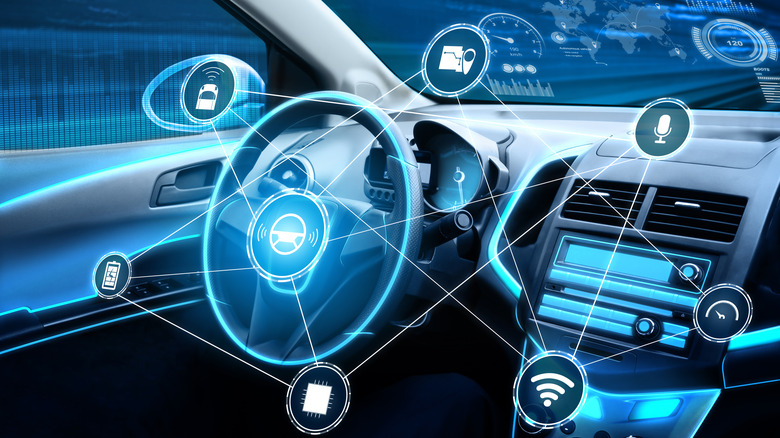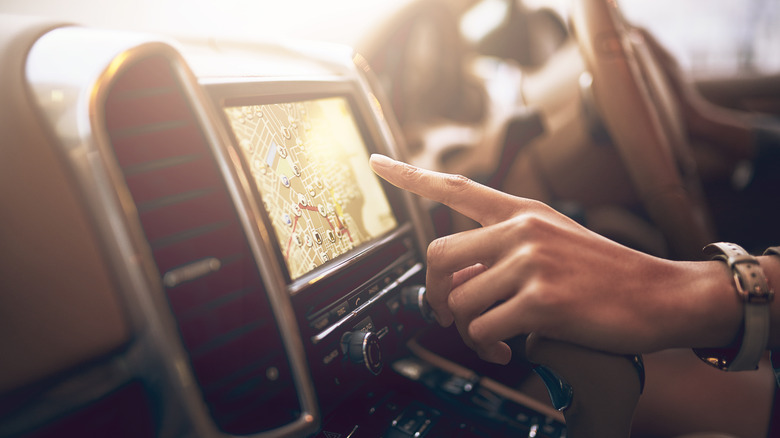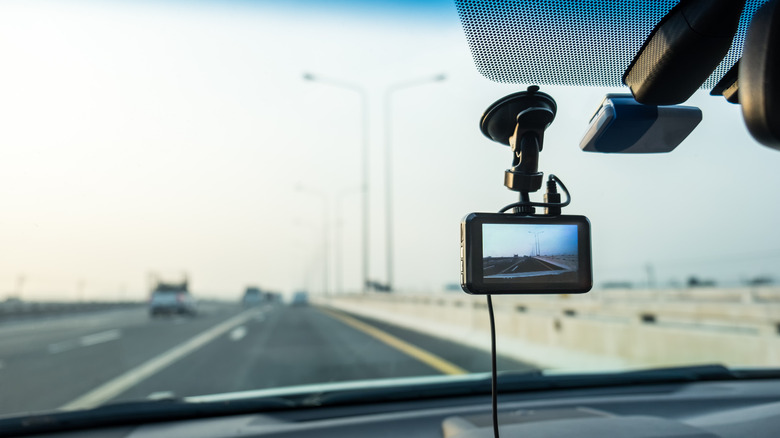Yes, Your Car Is Spying On You: Here's How, And What It Means
If you've ever had the sneaky suspicion that your car knows what you're saying, you could be right — sort of. The GPS you can't live without or the EDR (event data recorder) that collects data like speeding can actually harvest data beyond your knowledge (via Popular Mechanics). Technology has advanced to the point where the gadgets sitting in your car could actually cause you to get questioned or even arrested for a crime. Don't panic though, as this is only the worst-case scenario.
The way it works is that, in recent years, these gadgets have been updated to include technology that stores data like where your car is located or even voice recordings and biometrics taken by your car's camera and microphone. While this information can be handy, like all data, it could also be used in a non-beneficial way depending on who has access to it. Speaking to Reader's Digest, digital privacy expert Jean-Paul Schmetz stated, "You need to operate under the assumption that the data your car collects about you will be used in a variety of different ways you cannot control or remove consent from later on. This data is often sold to advertisers but could also be sold to insurers or other third-party businesses that may have interest in it."
Systems like your GPS could be holding more information than you think
As reported by Driving, an offshoot of The Sunday Times, GPS systems can even help police to solve previously unsolvable crimes. When Wai Hong Tsang murdered his ex-wife in England, he had a solid alibi. However, as time went on, police became suspicious of Tsang and checked his navigational system. Using the system, police saw that his car had been sitting empty for two hours during in the time when his wife was killed. Using this knowledge, they were able to check CCTV and saw him on a bicycle both before and following the murder, leading to his arrest and conviction. In summary, while your navigational system can't give a wealth of information, it can give information on your whereabouts.
Additionally, per Popular Mechanics, some GPS systems are connected to service providers who can then make calls. While this is harmless on the surface, and indeed can be extremely useful in emergencies, it also means your data could be being sold without your permission. Not only this, but several former Tesla workers told Reuters in 2023 that they not only could see who was behind the wheel, but had access to information like when a car crashed, and, worryingly, what the inside of people's garages or the outside of their properties looked like.
An EDR can hold a lot of data that could even be used in court
If your car has an EDR, this is another way it's essentially spying on you. Via the National Highway Traffic Safety Administration, event data recorders can monitor functions like the state of a vehicle just before a crash, post-crash data, and whether brakes were used. This is useful information if you were the victim of a crash rather than the perpetrator, but the concern is about who can access this data. However, per Wired, those in the auto industry believe monitoring car data can be used for good. Greg Neiswander, research and testing lead for Android Auto, said that driver-monitoring technology could be used to "theoretically make people more aware drivers, better drivers."
Moreover, Bryan Reimer, a research scientist at MIT, brought up the conversation of how monitoring car data can be useful for the future. "The question is not, can we monitor the driver? But can we support them more efficiently?" he asked. Whichever way you feel about it, the bad news is that not much can be done about stopping your car data from being monitored and sold — at least for now. The good news is that this data probably won't ever be used to indict you negatively unless it shows you were at fault for a severe accident or crime.


